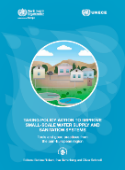Taking policy action to improve small-scale water supply and sanitation systems. Tools and good practices from the pan-European Region (2016)

Download
2016, xiii + 80 pages
ISBN 978 92 890 5160 6
Access to adequate water and sanitation services is essential for good individual and population health. People served by small-scale systems in rural areas and small towns have the right to the same level of health protection as others. Goals 3 and 6 of the 2030 Agenda for Sustainable Development call for combating waterborne diseases and ensuring universal and equitable access to both safe drinking-water and adequate sanitation for all by 2030. Achieving universal access requires paying due attention to the particular circumstances and challenges that may impair the provision of safe and sustainable services by small-scale water supply and sanitation systems.
Improving such systems is a priority area under the Protocol on Water and Health to the 1992 Convention on the Protection and Use of Transboundary Watercourses and International Lakes. This publication was developed under the Protocol; it aims to support effective policy action and promote good practices for creating an enabling environment in which to improve the situation of small-scale systems. It introduces a variety of tools available to policy-makers and highlights how these can be tailored to the particular circumstances of small-scale systems. It also presents a number of case studies showing how countries have acted to improve the situation of small systems.
This publication aims to inspire practitioners and policy-makers who develop water supply and sanitation policies and programmes at the national or subnational levels to consider improvement actions that they can adapt for their own circumstances. It further assists policy-makers in formulating specific targets for small-scale systems and in planning concrete actions for their achievement. Other stakeholders – such as aid and funding agencies, local governments and nongovernmental organizations – may also find the information relevant for their programmes and projects.



